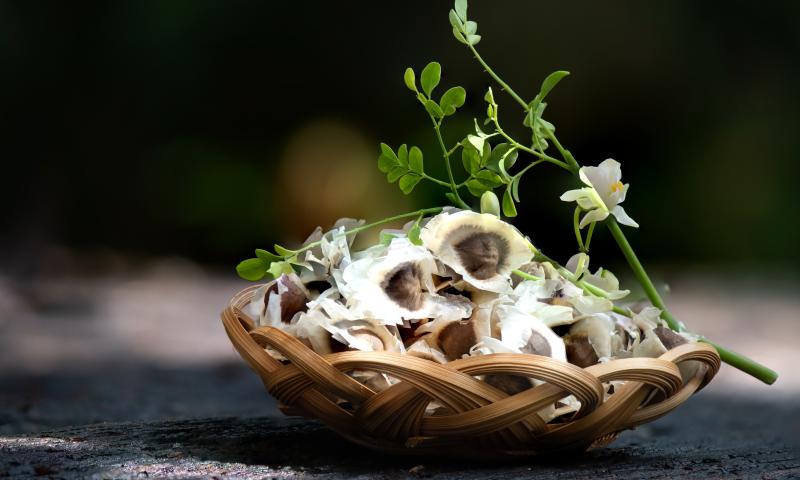 />
/>
Moringa Oleifera, often dubbed as the "Miracle Tree" or "Tree of Life," is a botanical marvel revered for its multifaceted benefits. From its resilient growth in various habitats to its rich nutritional profile, Moringa has captured the attention of health enthusiasts worldwide.
Botanical Characteristics:
Moringa Oleifera belongs to the Moringaceae family and is native to the sub-Himalayan regions of India, Pakistan, Bangladesh, and Afghanistan. This fast-growing, drought-resistant tree can reach heights of up to 10 meters (33 feet). Its compound leaves, comprised of small leaflets, resemble feathers, and its white flowers give way to long, slender pods containing seeds. Every part of the Moringa tree, including its leaves, pods, seeds, and roots, is utilized for various purposes.
Chemical Composition:
Moringa Oleifera is a nutritional powerhouse, boasting a rich array of vitamins, minerals, antioxidants, and bioactive compounds. Its leaves are particularly dense in essential nutrients, including vitamin C, vitamin A, vitamin E, vitamin K, calcium, potassium, iron, and protein. Additionally, Moringa contains phytochemicals such as flavonoids, phenolic acids, and glucosinolates, which contribute to its medicinal properties.
Habitat and Taste:
Moringa Oleifera thrives in diverse climates, ranging from tropical to subtropical regions. It flourishes in well-drained, sandy or loamy soils and is known for its ability to withstand arid conditions. In terms of taste, Moringa leaves have a slightly peppery flavor, reminiscent of arugula, while the seeds and pods offer a more neutral taste profile.
Historical Facts:
The historical roots of Moringa trace back thousands of years, with evidence of its usage in ancient civilizations such as the Egyptians, Greeks, and Romans. Throughout history, various cultures have revered Moringa for its medicinal properties and nutritional value. In Ayurvedic medicine, Moringa has been traditionally employed to treat a wide range of ailments, earning it the moniker "Sahijan," meaning "beneficial" in Sanskrit.
General Health Benefits:
The consumption of Moringa Oleifera is associated with a myriad of health benefits. Its high vitamin and mineral content support overall health and well-being, aiding in immune function, bone strength, and vision. Moringa's potent antioxidant properties help combat oxidative stress and inflammation, reducing the risk of chronic diseases. Moreover, Moringa has been studied for its potential to lower cholesterol levels, regulate blood sugar levels, and promote cardiovascular health.
Indications for Use:
As per FDA regulations, it's important to note that while Moringa Oleifera offers numerous health benefits, it is not intended to diagnose, treat, cure, or prevent any disease. Individuals interested in incorporating Moringa into their diet should consult with a healthcare professional, especially if pregnant, nursing, or taking medications.
In conclusion, Moringa Oleifera stands as a botanical marvel, revered for its nutritional richness and therapeutic potential. From its resilient growth to its diverse health benefits, Moringa continues to captivate the attention of researchers and health enthusiasts alike. While its historical significance and traditional uses underscore its cultural importance, it's crucial to approach Moringa consumption with informed discretion and consult with healthcare professionals for personalized guidance. Unlock the nutritional treasure trove of Moringa Oleifera and embrace its wonders on the journey to holistic wellness.
